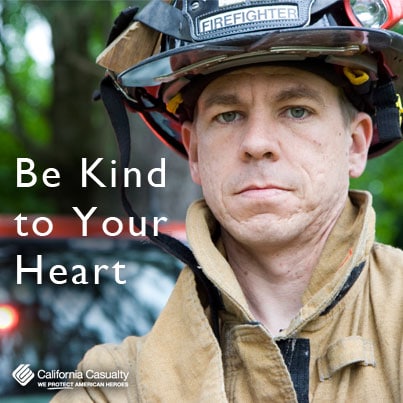The life of a firefighter can be tough: long shifts, being awakened from a deep sleep with a pulse pounding alarm and having to deal with the aftermath of a terrible fire or crash.
This heart-healthy reminder is especially important for firefighters, many who think a heart attack can’t happen to them. Well, think again; working odd shifts, responding to fires and crashes and inhaling smoke takes its toll. Research by Harvard doctor Stefanos Kales found firefighters have one of the most stressful jobs in the United States and cardiovascular disease remains the primary on-duty and lifetime mortality risk. Kales found the risk of death from coronary heart disease significantly increased during the strenuous activity associated with fire suppression and during certain physical training activities. His conclusion: most fire departments lack fitness and health programs, putting firefighters at risk.
Warning Signs:
The Centers for Disease Control and Prevention cites three major risk factors for heart disease:
- High blood pressure
- High LDL cholesterol
- Smoking
These other medical conditions and lifestyle choices also put people at a higher risk:
- Diabetes
- Obesity and being over-weight
- Poor Diet
- Physical Inactivity
- Excessive alcohol use
Work stress can also take a toll on your heart. Firefighting veteran Linda Willing wrote a great piece for FireRescue1.com identifying nine sources of stress that firefighters need to be aware of:
- Shift work
- Sleep deprivation
- Inadequate training
- Gear and technical problems
- Bad Crews
- Malicious co-workers
- Inconsistent policies
- Poor leadership
- Bad or disturbing calls
Do you know the symptoms of a heart attack? Pay attention; here are the most prevalent warning signs:
- Chest pain or discomfort
- Upper body pain or discomfort in the arms, back, neck, jaw or upper stomach
- Shortness of breath
- Nausea, lightheadedness or cold sweats
And women are not immune to heart disease. While the incidence of heart related death rates have steadily declined for men, rates for women have fallen at a slower rate.
Recommendations:
A recent article in Cardiac Health offered these firefighter heart safety recommendations:
- Fire departments should provide mandatory preplacement and annual medical exams for all firefighters
- Fire departments should implement wellness and fitness programs to reduce risk factors from heart disease
- All firefighters should have annual physical performance evaluations
- Improved oxygen masks should be provided by fire departments
The National Volunteer Fire Council has created a Webpage dedicated to the healthy firefighter with information on healthy diet and exercise, lifestyle changes and training that can battle the incidence of heart related conditions. Here are some of the heart-healthy tips they recommend:
- Don’t smoke, and if you already do, try to quit – smokers are up to six times more likely to suffer a heart attack than non-smokers
- Aim for a healthy weight – overweight and obesity cause many preventable deaths
- Get moving and commit to regular exercise
- Eat for heart-health – a diet that is low in saturated fat, trans-fat, and cholesterol that includes whole grains, vegetables, and fruits
- Know your numbers – blood pressure, heart rate, glucose cholesterol (total, HDL, LDL, triglycerides)
Loving your heart will help restore energy, vitality and could prolong your career and your life. It’s not difficult; just tackle one or two heart-healthy tips at a time.
California Casualty has a long relationship with fire groups across the nation providing quality insurance with exclusive benefits not available to the general public. Get a policy review today at 1.800.800.9410 or at www.calcas.com/firefighters.
Sources for this article:
https://www.heart.org/HEARTORG/
https://www.cdc.gov/heartdisease/facts.htm
https://www.firerescue1.com/exclusives-1/articles/2100834-9-sources-of-firefighter-stress/
https://archive.sph.harvard.edu/press-releases/2007-releases/press03212007.html
https://www.cardiachealth.org/heart-disease-firefighters
https://www.healthy-firefighter.org/
- Educators Receive $1,000 Athletic Grants from California Casualty - May 22, 2024
- Music & Arts Grant Recipients – 2023 - December 1, 2023
- How to Tell When You Need New Brakes - November 20, 2023

